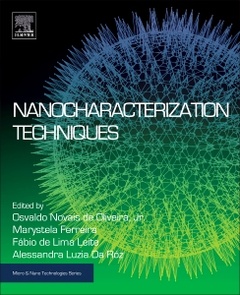Nanocharacterization Techniques Micro and Nano Technologies Series
Coordonnateurs : de Oliveira Jr Osvaldo, Marystela Ferreira LG, de Lima Leite Fábio, Luzia Da Róz Alessandra

Nanocharacterization Techniques covers the main characterization techniques used in nanomaterials and nanostructures. The chapters focus on the fundamental aspects of characterization techniques and their distinctive approaches. Significant advances that have taken place over recent years in refining techniques are covered, and the mathematical foundations needed to use the techniques are also explained in detail. This book is an important reference for materials scientists and engineers looking for a through analysis of nanocharacterization techniques in order to establish which is best for their needs.
1. Scanning Electron Microscopy 2. Atomic Force Microscopy: A Powerful Tool for Electrical Characterization 3. Spectroscopic Techniques for Characterization of Nanomaterials 4. Dynamic Light Scattering Applied to Nanoparticle Characterization 5. X-Ray Diffraction and Scattering by Nanomaterials 6. Surface Plasmon Resonance (SPR) for Sensors and Biosensors
Materials scientists and engineers, as well as those working in the natural and life sciences seeking a reference work outlining the essential principles of nanostructures and nanomaterials. Scientists working in related disciplines, who may be relatively new to nanotechnology, and graduate students.
.
Prof. Dr . Marystela Ferreira received her PhD in Physical Chemistry from University of São Paulo, Brazil. She is currently a professor at the Federal University of São Carlos, and specializes in the following areas: eletrooxidation , thin films , sensors and biosenssores , phenolic compounds , HPLC and MEQC.
Fabio Leite de Lima obtained his PhD in Materials Science and Engineering from University of São Paulo, Brazil, Between 2006 and 2009, he was a Postdoctoral Fellow at the Institute of Physics of São Carlos (IFSC-USP) in collaboration with Embrapa Agricultural Instrumentation. He was Fellow Young Researcher FAPESP (2009-2012). He has collaborated with Prof. Dr. Alan Graham MacDiarmid, winner of the Nobel Prize in Chemistry 2000, with whom he published the first article in the Journal of Nanoscience and Nanotechnology, in 2009. He is currently Adjunct Professor at the Federal University of São Carlos (UFSCar) - Campus Sorocaba, Coordinator of the Research Group in Nanoneurobiofísica and Future Scientist Program. He has conducted research the areas of nanoscience and nanotechnology, with emphasis
- Includes a detailed analysis of different nanocharacterization techniques, allowing readers to explore which one is best for their particular needs
- Provides examples of how each characterization technique has been used, giving readers a greater understanding of how each technique can be profitably used
- Covers the mathematical background needed to utilize each of these techniques to their best effect, meaning that readers can gain a full understanding of the theoretical principles behind each technique covered
- Serves as an important, go-to reference for materials scientists and engineers
Date de parution : 03-2017
Ouvrage de 222 p.
19x23.3 cm
Thèmes de Nanocharacterization Techniques :
Mots-clés :
atomic force microscopy; biomolecular interactions; Brownian movement; diffraction; dynamic light scattering; electrostatic force microscopy (EFM); infrared; intermittent contact; kinematic theory; lithography; microanalysis; microdistortion; microscopy; Miller indices; molecular organization; nanoassembly; nanocharacterization; nanofabrication; nanomachine; nanomanipulation; nanomaterial; nanoparticles; nanostructures; particle diameter; particle size; Raman scattering; Rayleigh scattering; scattering; SERS; spatial resolution; spectroscopy; SPR applications; surface plasmon resonance; surface-enhanced Raman scattering; thin films; topographical image; UV-vis; X-ray diffraction; X-ray scattering



